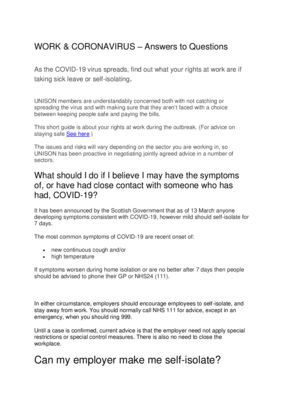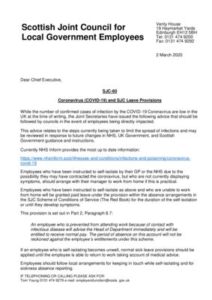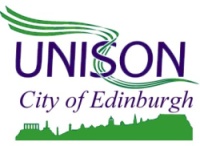
UNISON Scotland’s Q&A On Coronavirus & Work is at https://unison-scotland.org/qa-on-coronavirus-work/
The latest advice from Public Health Scotland is at. Please check the date, this is constantly updated: https://www.hps.scot.nhs.uk/a-to-z-of-topics/covid-19
The guidance for provision of home care was updated on 12 March and can be found here: https://hpspubsrepo.blob.core.windows.net/hps-website/nss/2980/documents/1_COVID-19%20Guidance-for-Social-or-community-care-and-residentail-settings.pdf
The guidance on educational settings can be found here: https://www.hps.scot.nhs.uk/web-resources-container/covid-19-guidance-to-educational-settings

SJC Leave Provision
For the Scottish Joint Council (the local government employers/unions body) provisions click here or on the graphic.
The key message is that employees who have been instructed to self-isolate on medical advice, and who are unable to work from home, will be granted paid leave under the provision within the absence arrangements in the SJC Scheme of Conditions of Service (The Red Book) for the duration of the self-isolation or until they develop symptoms.
The unions have set up a Workforce Advisory group with COSLA, bringing together local authority HRDs/TUs etc from across Scotland, to try to ensure consistency in approach. The first meeting of this group will take place via conference call on Tuesday morning 17 March.
Social Care
For members working in social care, where there is a concern that the service user being cared for has been instructed by medical professionals to self-isolate or where there is a concern that the individual is showing symptoms of the virus, Health Protection Scotland have included advice about this here:
The key paragraphs are….
“2.8 Home Visits (Including Primary Care, Third-Sector and Volunteers)
People returning from some areas of the world are being told to self-isolate depending on the location they have visited and their symptoms. People who have been in close contact with a confirmed case of COVID-19 are also being advised by the local Health Protection Team to self-isolate. People who are self-isolating and have no symptoms do not pose a risk to others. They are self-isolating to allow closer monitoring in order to identify early symptoms, and to enable prompt medical action if required.
If a person is in self-isolation, health and social care staff should ascertain if the individual has symptoms prior to their visit. It may become necessary to suspend some home visits and alternative arrangements must be put in place to maintain contact (e.g. telephone liaison). Health and social care staff performing non-deferrable essential visits (for example, child protection, personal or nursing care) to households where there is an individual self isolating, should follow the guidance below:
• If the person receiving the home visit has no symptoms
As the person has no symptoms there is no need to change your approach.
• If the person receiving the home visit has symptoms
If during a telephone consultation with a client or their family member / representative to assess their suitability for a domiciliary visit, it is thought that COVID-19 is a possibility then a domiciliary visit should be avoided. Instead, call the client’s GP or NHS 24 (phone 111) for further advice.
If during a domiciliary visit it is thought that COVID-19 is a possibility, then:
· avoid any further physical contact with the person, if you can. The person should remain in the room with the door closed.
· advise anyone with you not to enter the room.
· ask the patient or their family member/representative to call their GP or NHS 24 for further advice.
· inform your manager and contact your local Health Protection Team for advice.
· if the client or resident is seriously ill and requires urgent medical attention, phone 999 and inform the ambulance call handler of the potential links to COVID-19.
If after assessment the person has a negative COVID-19 test, then no further action is required.
If after assessment the person has a positive COVID-19 test, then the local Health
Protection Team will be in contact with you and will carry out a risk assessment, identify people who have been in contact with the case and advise on any actions or precautions that need to be taken.”

